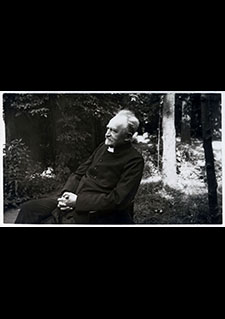Working on Church Committees
In October of 1935, Reich Minister of Church Affairs Hanns Kerrl began appointing so-called “church committees”, which were intended to assume the leadership of the divided Protestant church until it was finally reorganized.
Kerrl filled the church committees with representatives of the ecclesio-politically neutral center and moderate members of the Confessing Church and German Christians. This make-up corresponded to his aim of creating a unified Protestant Reich Church controlled by the state, in which all of German Protestantism’s factions would work together amicably.
In addition to establishing the Reich Church Committee presided over by Wilhelm Zoellner, Kerrl also succeeded in appointing committees in the Evangelical Church of the Old Prussian Union and some other regional churches.
In an appeal of October 17, 1935, the church committee of the Reich Church and the Old Prussian Regional Church professed its faith in the Gospel of Jesus Christ as it is witnessed in Scripture and was revealed anew in the Confessions of the Reformation but simultaneously approved of the nation’s Nazi evolution on the basis of race, blood and soil and called upon parishes to stand by Volk, Reich und Führer with intercessory prayer, loyalty and obedience.
Representatives of nearly every faction in the church displayed willingness to work on the church committees. Even individual members of the Confessing Church joined the committees. While the intact regional churches prevented the formation of church committees in their own churches, they nevertheless advocated limited cooperation with them.
The Councils of Brethren in the destroyed regional churches, which refused to cooperate with the committees in any way, constituted an exception. Radical German Christians also disapproved of the committees because they feared for their positions of power. The issue of committees precipitated the Confessing Church’s split in 1936.
At first, the committees actually contributed to bringing peace to the church, for instance by rescinding ecclesio-political disciplinary actions. The Reich Minister of Church Affairs’ policy on church committees already began to fail after a brief time, however.
At the latest, the ministry began to hamper the committees severely in the summer of 1936, when the Reich Church Committee condemned the heresies of the Thuringian German Christians, because they supposedly gave preferential treatment to the Confessing Church. Disillusioned, the Reich Church Committee resigned in February of 1937. The ministry also disbanded the other committees shortly thereafter.
Source / title
- ©Evangelisches Zentralarchiv in Berlin, Best. 500 Nr. 3780

